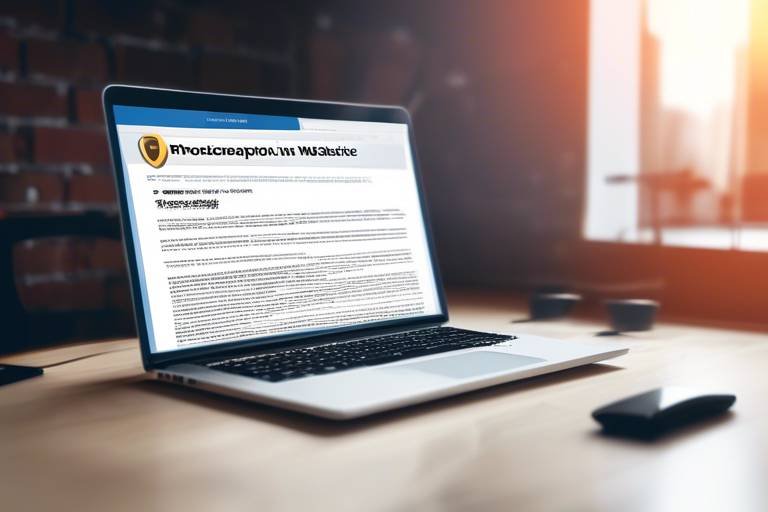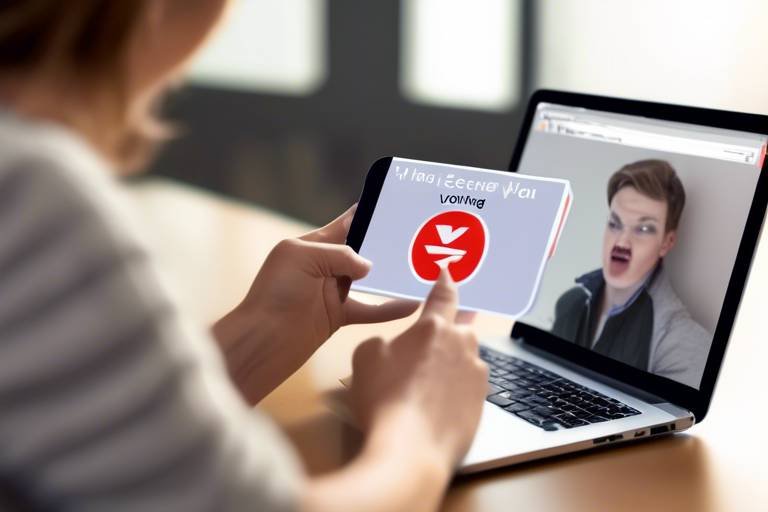What Can You Do if Your Personal Information Has Been Stolen Online?
In today's digital age, the threat of having your personal information stolen online is more real than ever. With just a few clicks, cybercriminals can access sensitive data that could lead to identity theft, financial loss, and a myriad of other complications. So, what can you do if you find yourself in this alarming situation? First, it's crucial to remain calm and take a systematic approach to mitigate the damage. The following sections will guide you through essential steps to take if your personal information has been compromised.
Before you can tackle identity theft, you need to be aware of its signs. Think of it like a smoke alarm; the sooner you hear it, the faster you can respond to the fire. Common indicators include unusual transactions on your bank statements, unfamiliar accounts appearing in your credit report, or receiving notifications from financial institutions about changes you didn’t make. If you notice any of these red flags, it’s time to take action.
If you suspect that your personal information has been stolen, acting quickly is essential. The longer you wait, the more damage can be done. Start by securing your online accounts. Change passwords immediately, and consider enabling two-factor authentication for an extra layer of security. It’s like locking your doors and windows before leaving for vacation; you want to ensure that everything is secure before you step away.
Your first call should be to your bank and credit card companies. Report any unauthorized transactions and ask them to freeze your accounts. They can guide you through the recovery process and help investigate fraudulent charges. Think of them as your first line of defense; they have the tools and resources to help you navigate this crisis.
Another critical step is to place a credit freeze. This action prevents new accounts from being opened in your name, which can be a lifesaver in stopping identity thieves in their tracks. To initiate a freeze, you’ll need to contact the three major credit bureaus: Equifax, Experian, and TransUnion. Here’s a quick overview:
| Credit Bureau | Website | Phone Number |
|---|---|---|
| Equifax | equifax.com | 1-800-349-9960 |
| Experian | experian.com | 1-888-397-3742 |
| TransUnion | transunion.com | 1-888-909-8872 |
Freezing your credit is like putting a "Do Not Enter" sign on your financial identity; it stops thieves from gaining access to your accounts.
Once you’ve secured your accounts, it's time to keep a close eye on your financial activity. Regularly checking your bank and credit card statements can help you spot suspicious transactions early. There are also various tools and apps available that can automate this process for you. Think of these tools as your watchdogs; they’re always on alert, ready to bark if something seems off.
After taking immediate action, it’s crucial to report the theft. File a report with the Federal Trade Commission (FTC) and your local law enforcement. This step is vital not only for your own records but also for tracking and combating identity theft on a larger scale. It’s like ringing the alarm bell; it alerts the authorities to the problem and helps them take action.
Once you’ve reported the theft, the next step is restoring your identity. This process can be tedious but is essential for regaining control. Start by disputing any fraudulent charges with your bank and credit card companies. You’ll also want to obtain a copy of your credit report to ensure that all information is accurate. It’s like cleaning up after a storm; you need to clear the debris to see the way forward.
Consider enrolling in an identity theft protection service. These companies specialize in monitoring your personal information and can assist in recovery efforts if your identity is compromised again. They act like a security system for your personal data, providing peace of mind in an increasingly digital world.
In some cases, you may need to seek legal advice to resolve issues stemming from identity theft. If your situation becomes complicated, consult with a lawyer who specializes in identity theft. They can guide you through the legal maze and help you reclaim your identity. Think of them as your legal lifeline, ready to pull you from the depths of confusion.
- What should I do first if I think my information has been stolen? Contact your financial institutions immediately.
- How long does it take to restore my identity? It varies, but prompt action can significantly shorten the recovery period.
- Are identity theft protection services worth it? Yes, they can provide valuable monitoring and support.
- Can I report identity theft online? Yes, you can report it to the FTC through their website.

Recognizing Signs of Identity Theft
Understanding the early warning signs of identity theft can be your first line of defense against a potentially devastating situation. You might think, "It won't happen to me," but the truth is, identity theft can strike anyone, and often when you least expect it. So, how can you tell if your personal information is at risk? Here are some common signs to watch out for:
First and foremost, keep an eye on your financial accounts. If you notice unusual transactions that you didn’t authorize, that’s a major red flag. It could be as simple as a small charge that seems out of place, or a larger transaction that leaves you scratching your head. Sometimes, it’s the little things that point to a bigger problem. For instance, if you see a charge for a subscription service you never signed up for, it’s time to dig deeper.
Another sign to watch for is receiving unfamiliar account statements. This could be anything from a credit card bill to a bank statement for an account you didn’t open. If you get something in the mail that doesn’t belong to you, it’s a clear indication that someone might be using your information without your permission. Think of it like finding someone else’s mail in your mailbox; it’s a sign that something is off.
Additionally, be vigilant about notifications from your financial institutions. If you receive alerts about changes to your account—like a new address or contact number that you didn’t set up—don’t ignore them. These notifications can be the canary in the coal mine, signaling that your personal information is being manipulated. It’s like a smoke alarm going off; you need to take it seriously and investigate.
Credit monitoring can also play a crucial role in recognizing identity theft. If you notice a sudden drop in your credit score, it could be due to someone opening accounts in your name or failing to make payments on accounts you never authorized. Regularly checking your credit report can help you catch these discrepancies early. Remember, just as you wouldn’t ignore a check engine light in your car, you shouldn’t overlook signs of potential fraud in your financial life.
In summary, staying alert to these signs is essential for protecting your identity. If you notice any of these warning signals, don’t hesitate to take action. The sooner you recognize the issue, the quicker you can respond and mitigate the damage. After all, being proactive is far more effective than trying to pick up the pieces after the fact.
- What should I do if I suspect identity theft? If you suspect identity theft, immediately check your accounts for unauthorized transactions, contact your financial institutions, and consider placing a fraud alert on your credit report.
- How can I protect myself from identity theft? Regularly monitor your financial accounts, use strong passwords, and consider identity theft protection services to help safeguard your personal information.
- What are the first steps to take if my identity has been stolen? Report the theft to your financial institutions, freeze your credit, and file a report with the Federal Trade Commission (FTC).

Immediate Steps to Take
If you suspect that your personal information has been stolen, it's crucial to act quickly. Think of it like a fire alarm going off in your home; you wouldn't just sit there, right? The first step is to take a deep breath and gather your thoughts. Panic can cloud your judgment, but staying calm will help you navigate this challenging situation more effectively.
Start by securing your accounts. Change your passwords immediately, especially for your email and banking accounts. Use a strong password that combines letters, numbers, and symbols—something like "G@rden!2023" is much harder to crack than "password123." If you use the same password across multiple sites, it’s time to change those too. Consider using a password manager to keep track of your new, unique passwords.
Next, contact your financial institutions. This is not just a precaution; it's a necessity. Call your bank and credit card companies to report any unauthorized transactions. They can help freeze your accounts and investigate any fraudulent charges. Many institutions have dedicated fraud departments that can guide you through the recovery process. Make sure to write down the names of the representatives you speak with and any reference numbers for your calls. This information can be invaluable later on.
One of the most effective ways to protect yourself is by placing a credit freeze. Think of it as locking your front door; it prevents anyone from entering without your permission. A credit freeze restricts access to your credit report, making it nearly impossible for identity thieves to open new accounts in your name. To initiate a freeze, you need to contact the three major credit bureaus: Experian, TransUnion, and Equifax. Each bureau has its own process, but it typically involves filling out a form online or calling their customer service. Here’s a quick overview:
| Credit Bureau | Website | Phone Number |
|---|---|---|
| Experian | experian.com | 1-888-397-3742 |
| TransUnion | transunion.com | 1-888-909-8872 |
| Equifax | equifax.com | 1-800-349-9960 |
Once your credit is frozen, you will receive a PIN or password that you can use to lift the freeze when needed. This is a temporary measure but incredibly effective in preventing further identity theft.
After securing your accounts and freezing your credit, it's essential to monitor your account activity closely. Regularly check your bank and credit card statements for any suspicious transactions. If you notice anything unusual, report it immediately. Set up alerts with your bank to notify you of transactions over a certain amount or changes to your account. Many banks offer mobile apps that make this process easier, allowing you to keep a close eye on your finances.
Additionally, consider signing up for a credit monitoring service. These services can alert you to any changes in your credit report, such as new accounts opened in your name or significant changes to your credit score. While some services come with a fee, many banks offer free monitoring tools to their customers. It’s a small price to pay for peace of mind when your identity is at stake.
In conclusion, taking immediate action is crucial if your personal information has been compromised. By securing your accounts, freezing your credit, and actively monitoring your financial activity, you can significantly reduce the risk of further damage. Remember, the sooner you act, the better your chances of regaining control over your identity.
Q: What should I do if I find unauthorized transactions on my account?
A: Immediately report the transactions to your bank or credit card company. They can help you dispute the charges and may issue a refund.
Q: How long does a credit freeze last?
A: A credit freeze lasts until you lift it. You can lift it temporarily or permanently, depending on your needs.
Q: Are there any costs associated with freezing my credit?
A: No, freezing your credit is free of charge. You can request a freeze from each of the major credit bureaus without any fees.
Q: How can I monitor my credit for free?
A: You can check your credit report for free once a year at AnnualCreditReport.com. Additionally, many banks offer free credit monitoring services to their customers.

Contacting Financial Institutions
If you suspect that your personal information has been compromised, the first and most critical step is to contact your financial institutions without delay. Think of your bank and credit card companies as your first line of defense against fraud. They have the tools and resources to help you navigate this turbulent situation and protect your hard-earned money. So, what should you do?
Start by calling the customer service numbers for your bank and credit card providers. Have your account information handy, as this will speed up the process. When you speak to a representative, explain the situation clearly and concisely. Mention any unauthorized transactions you've noticed and express your concerns about potential identity theft. Most institutions have protocols in place for such incidents, and they can guide you through the necessary steps to secure your accounts.
Here are some actions your financial institutions may take:
- Freezing Accounts: They can temporarily freeze your accounts to prevent any further unauthorized transactions.
- Investigating Fraudulent Charges: They will often initiate an investigation into any suspicious activity on your account.
- Issuing New Cards: If your credit card information has been compromised, they can issue a new card with a different number to prevent further misuse.
- Providing Guidance: They can offer advice on additional steps you should take, such as placing fraud alerts on your credit report.
In addition to contacting your bank and credit card companies, it's wise to check with other financial institutions where you hold accounts. If you have investment accounts or loans, notify those providers as well. The more proactive you are, the better chance you have of minimizing the damage caused by identity theft.
After you've reported the theft, keep a record of all your communications. Document the names of the representatives you spoke with, the dates of your calls, and any reference numbers provided. This information can be invaluable if you need to follow up or escalate the issue later.
Remember, the sooner you act, the better your chances are of mitigating the impact of identity theft. Financial institutions are equipped to handle these situations, so don't hesitate to reach out to them for help. They are your partners in safeguarding your financial health and restoring your peace of mind.
Q: What should I do if my bank account has been hacked?
A: Immediately contact your bank to report the unauthorized access. They can help you freeze your account and investigate any fraudulent transactions.
Q: How long does it take to resolve identity theft issues with financial institutions?
A: The timeline can vary depending on the complexity of the case, but most institutions aim to resolve these issues as quickly as possible, often within 30 days.
Q: Will my bank cover the losses from identity theft?
A: Many banks have policies in place to protect customers from losses due to fraud, but you should report the theft promptly to ensure you're covered.
Q: Should I contact the police if my identity has been stolen?
A: Yes, filing a police report can be an important step in the recovery process and may be required by your bank or credit card company.

Freezing Your Credit
When it comes to safeguarding your identity, is one of the most powerful tools at your disposal. Think of it as a security alarm for your financial identity. By placing a credit freeze, you prevent lenders from accessing your credit report, making it nearly impossible for identity thieves to open new accounts in your name. This proactive step is crucial, especially if you suspect that your personal information has been compromised.
To initiate a credit freeze, you'll need to contact the three major credit bureaus: Equifax, Experian, and TransUnion. Each bureau has its own process, but generally, you can complete the freeze online, over the phone, or via mail. Here’s a brief overview of how to proceed:
| Credit Bureau | Website | Phone Number |
|---|---|---|
| Equifax | equifax.com | 1-800-349-9960 |
| Experian | experian.com | 1-888-397-3742 |
| TransUnion | transunion.com | 1-888-909-8872 |
When you request a freeze, you will typically need to provide some personal information such as your name, address, Social Security number, and date of birth. Once the freeze is in place, you'll receive a unique PIN or password that you must keep secure. This PIN is essential for lifting the freeze in the future, whether temporarily or permanently.
One of the best things about freezing your credit is that it’s free. There are no hidden fees or monthly charges, making it a cost-effective way to protect your financial future. However, it's important to note that while a credit freeze blocks new accounts from being opened, it does not affect your existing accounts. You will still be able to use your credit cards and loans as usual.
In addition, you might wonder how a credit freeze impacts your credit score. The good news is that it does not affect your score at all. Your credit report remains intact, and the only change is that lenders cannot access your report without your permission. This makes it a highly effective strategy for anyone concerned about identity theft.
In summary, freezing your credit is a simple yet powerful step in protecting your identity from potential fraud. It’s like putting a lock on your front door—while it doesn’t stop someone from trying to break in, it certainly makes it much harder for them to succeed. So if you suspect that your personal information has been compromised, don’t wait—take action and freeze your credit today.

Monitoring Account Activity
Keeping a vigilant eye on your account activity is like having a security guard for your financial life. It’s essential to regularly check your bank and credit card statements to catch any suspicious activities before they escalate into significant issues. Imagine waking up one day to find that someone has drained your savings or maxed out your credit cards. The horror! But if you monitor your accounts closely, you can spot these discrepancies early on and take action.
Start by setting a routine. Check your statements weekly or even daily if you can. Look for any transactions that seem out of place—perhaps a charge from a store you’ve never shopped at or an unfamiliar subscription service. If something doesn’t feel right, don’t brush it off. Investigate immediately! You can also use online banking tools that often provide alerts for transactions over a certain amount, which can help you stay informed without having to dig through statements constantly.
Utilizing mobile banking apps can also enhance your monitoring experience. Many apps offer real-time notifications for transactions, allowing you to receive instant alerts whenever your card is used. This way, you can quickly identify unauthorized transactions and take action. Here’s a quick breakdown of some effective monitoring techniques:
- Set Up Alerts: Most banks allow you to customize alerts for various activities, such as withdrawals, deposits, and spending over a specified amount.
- Use Budgeting Apps: Apps like Mint or YNAB can help track your spending habits and alert you about unusual activity.
- Review Credit Reports: Regularly check your credit report for any new accounts or inquiries you don’t recognize. You can obtain a free report once a year from each of the three major credit bureaus.
Additionally, consider using identity theft protection services that offer monitoring features. These services can alert you to changes in your credit report or any suspicious activity involving your personal information. It’s like having a personal assistant dedicated to safeguarding your identity!
Remember, the sooner you detect suspicious activity, the quicker you can take action to mitigate damage. Whether it’s disputing fraudulent charges or reporting identity theft, being proactive is your best defense. Think of monitoring your account activity as a shield against the unexpected—an essential step in safeguarding your financial future.
Q: How often should I check my bank statements?
A: It’s advisable to check your bank statements at least once a week. More frequent checks can help you catch unauthorized transactions quickly.
Q: What should I do if I find a transaction I don’t recognize?
A: Contact your bank or credit card company immediately to report the transaction. They can guide you through the process of disputing the charge.
Q: Can I set up alerts for my accounts?
A: Yes! Most banks and credit unions offer customizable alerts for various transactions, which can help you stay informed about your account activity.
Q: What is identity theft protection, and is it worth it?
A: Identity theft protection services monitor your personal information and alert you to suspicious activity. While they come at a cost, they can provide peace of mind and help you recover more quickly if your information is compromised.

Reporting the Theft
When you discover that your personal information has been stolen, is a crucial step that cannot be overlooked. It’s like sounding the alarm in a fire; the quicker you act, the better chance you have of minimizing the damage. The first place to start is with the Federal Trade Commission (FTC). They provide a streamlined process for reporting identity theft, which can be done online or via phone. By filing a report with the FTC, you create an official record of the incident, which can be invaluable later when disputing fraudulent charges or accounts.
After contacting the FTC, it’s essential to reach out to your local law enforcement. Many people overlook this step, but having a police report can strengthen your case when dealing with creditors and financial institutions. When you visit the police department, be sure to bring along any documentation that supports your claim. This could include your FTC report, bank statements showing unauthorized transactions, and any correspondence you’ve received regarding the theft. Think of it as gathering your armor before heading into battle; the more prepared you are, the better your chances of winning.
Here’s a quick rundown of the steps you should take when reporting identity theft:
- File a report with the FTC: Visit IdentityTheft.gov to start the process.
- Contact local law enforcement: Bring necessary documents to file a police report.
- Inform your bank and credit card companies: Report unauthorized transactions and follow their guidance.
- Document everything: Keep a detailed record of all communications and reports filed.
In addition to these steps, it’s wise to notify the credit bureaus about the theft. You can place a fraud alert on your credit report, which can make it harder for identity thieves to open new accounts in your name. This alert acts like a red flag, notifying potential creditors to take extra steps to verify your identity before issuing credit. Remember, time is of the essence. The sooner you report the theft, the sooner you can start taking steps to recover your identity and protect your financial future.
Q: What should I do if my personal information is stolen?
A: Immediately report the theft to the FTC and your local law enforcement. Also, notify your bank and credit card companies.
Q: How can I place a fraud alert on my credit report?
A: You can contact one of the three major credit bureaus (Equifax, Experian, and TransUnion) to place a fraud alert. They will notify the other bureaus on your behalf.
Q: Is it necessary to file a police report?
A: While not always required, having a police report can be beneficial when disputing fraudulent charges and accounts.
Q: How long does it take to recover from identity theft?
A: Recovery time can vary significantly depending on the extent of the theft. It could take a few weeks to several months to fully restore your identity.

Restoring Your Identity
After the shocking experience of having your personal information stolen, the road to recovery can feel daunting. However, taking proactive steps can help you reclaim your identity and restore your peace of mind. The first thing you need to do is to dispute any fraudulent charges that may have appeared on your financial statements. This process typically involves contacting your bank or credit card issuer and providing them with details about the unauthorized transactions. Most institutions have dedicated fraud departments that can assist you, making it essential to act quickly to minimize any potential financial damage.
Next, consider obtaining a copy of your credit report. You are entitled to one free report per year from each of the three major credit bureaus: Experian, TransUnion, and Equifax. By reviewing your credit report, you can identify any unfamiliar accounts or inquiries that might indicate fraudulent activity. If you spot anything suspicious, it’s crucial to report it immediately to the credit bureau, as they can help you rectify inaccuracies and protect your credit score.
Another vital step in restoring your identity is to re-establish your creditworthiness. This may involve paying down existing debts, making timely payments on your current accounts, and perhaps even using secured credit cards to rebuild your credit score. Remember, your credit score is like a financial fingerprint; it reflects your history and reliability as a borrower. Just as you would nurture a garden, your credit requires care and attention to flourish again.
While navigating through these challenges, you might also want to consider working with identity theft protection services. These services can monitor your personal information across various platforms, alerting you to any suspicious activities in real-time. They often provide support in filing disputes and can assist you in the recovery process. Engaging with these services can feel like having a safety net, offering you peace of mind as you work to restore your identity.
In some cases, legal resources may be necessary to resolve issues stemming from identity theft. If you find that your attempts to dispute fraudulent charges or restore your credit are met with resistance, it might be time to seek legal advice. There are lawyers who specialize in identity theft cases and can guide you through the complexities of the legal system, ensuring that your rights are protected. Remember, you don’t have to navigate this challenging journey alone; support is available.
As you proceed with restoring your identity, keep in mind that it’s a process that requires patience and diligence. Document every step you take, from reporting fraudulent activity to communicating with financial institutions. This record can be invaluable should you need to escalate your case or seek additional assistance. Just like piecing together a puzzle, each action you take brings you closer to the complete picture of your restored identity.
- How long does it take to restore my identity? The timeline can vary based on the complexity of the situation, but with consistent effort, many people see improvements within a few months.
- What if my identity theft case goes to court? In such cases, having legal representation is crucial. A lawyer can help you navigate the legal system and advocate on your behalf.
- Are identity theft protection services worth it? Many find that these services provide valuable peace of mind and proactive monitoring, which can be beneficial, especially after experiencing identity theft.

Working with Identity Theft Protection Services
In today's digital landscape, where personal information can be just a click away, identity theft protection services have become essential allies in safeguarding your data. These services act like a security system for your personal information, alerting you to potential threats and helping you recover if your identity is compromised. But how do you choose the right service? And what should you expect from it?
First and foremost, it's crucial to understand the key features offered by these services. Most identity theft protection services provide a combination of monitoring, alerts, and recovery assistance. For instance, they often monitor your credit report and other public records to detect any suspicious activity. If someone tries to open a new account in your name or if there's a significant change in your credit report, you'll receive an alert. This prompt notification can be your first line of defense, allowing you to take action before the situation escalates.
Additionally, many services offer identity recovery assistance. If you fall victim to identity theft, these companies can guide you through the recovery process, helping you file reports, dispute fraudulent charges, and even liaising with credit bureaus on your behalf. Imagine having a team of experts at your side, ready to help you navigate the complexities of restoring your identity. It’s like having a personal coach in a marathon—you might still have to run the race, but you’re not doing it alone.
When considering an identity theft protection service, it’s vital to evaluate the cost versus the benefits. Some services charge a monthly fee, while others may offer a one-time payment. Here’s a quick comparison of what you might find:
| Service Type | Features | Typical Cost |
|---|---|---|
| Basic Monitoring | Credit report monitoring, alerts | $10 - $20/month |
| Comprehensive Protection | Monitoring, recovery assistance, insurance | $20 - $40/month |
| Premium Services | All features, additional services like VPN | $40+/month |
Choosing the right service requires some research. Look for customer reviews, check their ratings on independent review sites, and see what other users have to say about their experiences. A service that has a strong track record of effectively helping users recover from identity theft can be worth its weight in gold.
Moreover, consider whether the service offers a money-back guarantee. This can give you peace of mind, knowing that if you’re not satisfied, you can get your money back. After all, in the world of identity theft, trust is paramount. You want to partner with a service that prioritizes your security and satisfaction.
In conclusion, working with identity theft protection services can significantly enhance your ability to safeguard your personal information. While they are not a foolproof solution, they provide valuable resources and support that can make a world of difference in the event of identity theft. So, if you find yourself in a vulnerable position, don’t hesitate to reach out to these services—they could be the lifeline you need to reclaim your identity.
- What is identity theft protection? - Identity theft protection services monitor your personal information and help you recover in case of identity theft.
- How much do these services cost? - Costs can range from $10 to $40 or more per month, depending on the level of protection.
- Can I rely solely on these services? - While they provide valuable support, it's also important to practice good personal security habits.
- What should I do if I suspect my identity has been stolen? - Immediately contact your financial institutions, freeze your credit, and report the theft to the authorities.

Utilizing Legal Resources
When you find yourself in the unfortunate situation of identity theft, it can feel like you're navigating a chaotic storm without a compass. The emotional toll is heavy, and the complexities of legal proceedings can make it even more daunting. However, utilizing legal resources can provide you with the guidance and support you need to reclaim your identity and protect your rights. It’s essential to understand when to seek legal advice and how to leverage available resources effectively.
First and foremost, if you've experienced identity theft, consider consulting with a legal professional who specializes in this area. These experts can help you navigate the murky waters of identity theft laws and guide you through the steps necessary to resolve your situation. They can assist in drafting letters to creditors, disputing fraudulent charges, and even representing you if your case escalates to court. Remember, you don’t have to face this battle alone.
In addition to hiring a lawyer, there are several legal resources that can be beneficial:
- Legal Aid Organizations: Many non-profit organizations offer free or low-cost legal assistance to victims of identity theft. These organizations can provide valuable advice and support, especially for those who might not have the means to hire a private attorney.
- Consumer Protection Agencies: Various state and federal agencies, such as the Federal Trade Commission (FTC), provide resources and guidance for victims of identity theft. They can help you understand your rights and the actions you can take to protect yourself.
- Identity Theft Protection Services: Some companies offer legal services as part of their identity theft protection plans. These services often include access to legal experts who can help you navigate the recovery process.
It’s crucial to document every step of your journey. Keep records of all communications with financial institutions, law enforcement, and legal professionals. This documentation can be invaluable if you need to escalate the situation or prove your case in court. Think of it as building a fortress around your identity—every piece of information is a brick that reinforces your defense.
Finally, don't underestimate the power of community. Many local support groups and online forums exist where victims of identity theft share their experiences and advice. Engaging with others who have faced similar challenges can provide emotional support and practical tips that can make a significant difference in your recovery journey.
In conclusion, utilizing legal resources is not just about fighting back against identity theft; it's about empowering yourself to take control of your life again. By seeking legal advice, utilizing available resources, and staying informed, you can navigate the complexities of identity theft with confidence and resilience.
1. What should I do first if I discover my identity has been stolen?
You should immediately contact your financial institutions and report any unauthorized transactions. Additionally, consider placing a fraud alert on your credit report.
2. How can legal resources help me after identity theft?
Legal resources can provide guidance on disputing fraudulent charges, represent you in court if necessary, and help you understand your rights as a victim.
3. Are there free legal services available for identity theft victims?
Yes, many non-profit organizations offer free or low-cost legal assistance specifically for victims of identity theft.
4. Should I keep records of my communications during the recovery process?
Absolutely! Keeping detailed records of all communications is crucial for building your case and demonstrating your efforts to resolve the issue.
Frequently Asked Questions
- What should I do first if I suspect my personal information has been stolen?
If you think your personal information has been compromised, the first step is to act quickly. Start by contacting your banks and credit card companies to report any suspicious transactions. They can help you freeze your accounts and investigate any unauthorized charges.
- How do I freeze my credit, and why is it important?
Freezing your credit is a crucial step in preventing identity theft. You can initiate a credit freeze by contacting the three major credit bureaus: Experian, TransUnion, and Equifax. This process is usually free and stops new accounts from being opened in your name, providing an added layer of security.
- How can I monitor my account activity effectively?
Regularly checking your bank and credit card statements is essential. You can set up alerts through your financial institutions to notify you of any unusual transactions. Additionally, consider using identity theft monitoring services that can keep an eye on your personal information for any signs of fraud.
- What authorities should I report identity theft to?
You should report identity theft to the Federal Trade Commission (FTC) and your local law enforcement. The FTC provides a detailed recovery plan and helps you file a report, which can be useful for disputing fraudulent charges and restoring your identity.
- Can identity theft protection services really help?
Yes, identity theft protection services can be incredibly beneficial. They monitor your personal information across various platforms, alert you to suspicious activities, and assist in recovery efforts if your identity is stolen. It's like having a security system for your personal data!
- When should I consider seeking legal advice?
If you face complications in restoring your identity or dealing with fraudulent accounts, it may be time to seek legal advice. An attorney specializing in identity theft can help you navigate the complexities and ensure your rights are protected.



















